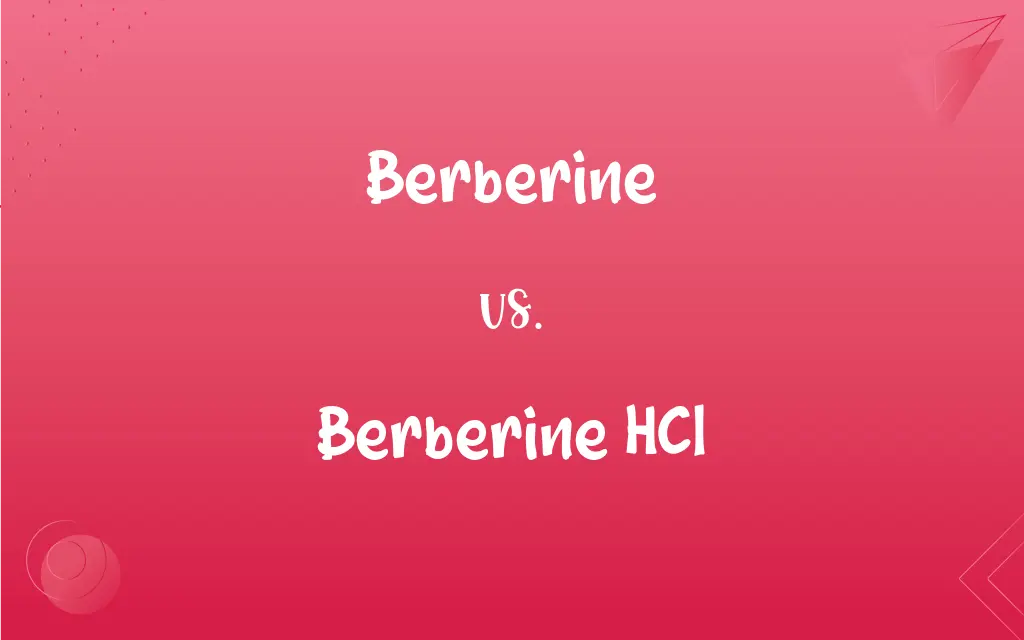Berberine vs. Berberine HCl: What's the Difference?
By Harlon Moss & Janet White || Published on March 1, 2024
Berberine is a bioactive compound found in several plants, while Berberine HCl is its hydrochloride form, enhancing solubility and absorption.

Key Differences
Berberine, a natural alkaloid, is extracted from various plants such as Berberis and has been used traditionally in medicine. Berberine HCl, on the other hand, is berberine combined with hydrochloric acid to form a salt, improving its bioavailability when ingested.
The primary difference lies in their physical properties; berberine is less soluble in water, which can limit its absorption in the digestive tract. Berberine HCl, due to its salt form, dissolves better in water, facilitating easier absorption and potentially increasing its effectiveness as a supplement.
Both forms have similar pharmacological effects, including antimicrobial, anti-inflammatory, and blood glucose-lowering properties, the enhanced solubility of Berberine HCl may lead to more consistent therapeutic outcomes.
Manufacturers often prefer Berberine HCl for dietary supplements because its improved solubility ensures a more reliable dosage and efficacy. Consumers might choose Berberine HCl over berberine for these reasons, despite potentially higher costs due to the additional processing involved.
Comparison Chart
Composition
Natural alkaloid compound
Berberine bound with hydrochloric acid
ADVERTISEMENT
Solubility
Low in water
High in water
Bioavailability
Lower due to poor solubility
Higher due to improved solubility
Form
Found in natural plant extracts
Processed into a hydrochloride salt
Use in Supplements
Less common due to solubility issues
Preferred for its enhanced absorption
Berberine and Berberine HCl Definitions
Berberine
A naturally occurring alkaloid with therapeutic properties.
Berberine is used in traditional medicine for its anti-diabetic effects.
ADVERTISEMENT
Berberine HCl
Suitable for use in standardized supplement formulations.
Berberine HCl's consistent solubility makes it ideal for precise dosing.
Berberine
Has a bitter taste and yellow color.
The distinctive yellow color of berberine is evident in powdered extracts.
Berberine HCl
May cost more than berberine due to processing.
The price of Berberine HCl reflects the additional steps required to enhance its bioavailability.
Berberine
Extracted from plants like Berberis.
The root of Berberis aristata is a common source of berberine.
Berberine HCl
The hydrochloride salt form of berberine, enhancing its solubility.
Berberine HCl is often found in dietary supplements for better absorption.
Berberine
Can improve lipid metabolism and aid in weight loss.
Berberine may help lower cholesterol levels in some individuals.
Berberine HCl
Maintains the benefits of berberine with improved absorption.
Like berberine, Berberine HCl can support blood sugar regulation.
Berberine
Known for its antimicrobial and anti-inflammatory actions.
Berberine has been studied for its ability to fight bacterial infections.
Berberine HCl
Used to improve bioavailability in the body.
Berberine HCl supplements are preferred for their increased effectiveness.
Berberine
A bitter, yellow alkaloid, C20H19NO5, obtained from several plants such as goldenseal and having medical uses as an antipyretic and antibacterial agent.
Berberine
Any of a class of alkaloid C20H19NO5 originally obtained, as a bitter, yellow substance, from the root of the barberry, goldthread, and other plants. It is used in medicine especially for its antimicrobial properties.
Berberine
An alkaloid obtained, as a bitter, yellow substance, from the root of the barberry, gold thread, and other plants.
FAQs
Can Berberine HCl provide the same benefits as berberine?
Yes, it offers the same benefits but with potentially greater efficacy due to better absorption.
Why is Berberine HCl preferred over berberine?
Its higher solubility and bioavailability make Berberine HCl more effective for therapeutic use.
What is Berberine?
Berberine is a compound extracted from certain plants used for its medicinal properties.
How do you take Berberine HCl?
It is typically taken as a dietary supplement in capsule or tablet form.
What is Berberine HCl?
Berberine HCl is berberine combined with hydrochloric acid to form a more soluble and bioavailable salt form.
Is Berberine HCl natural?
While berberine is naturally occurring, Berberine HCl is a processed form designed to improve its natural properties.
Can I switch from Berberine to Berberine HCl?
Yes, but consult a healthcare professional to ensure appropriate dosing and effectiveness.
How does Berberine HCl improve solubility?
The addition of hydrochloric acid forms a salt that is more soluble in water.
Are there any side effects of taking Berberine or Berberine HCl?
Both can cause gastrointestinal discomfort at high doses; consult a healthcare provider before starting.
Why is solubility important for berberine's effectiveness?
Improved solubility enhances absorption in the digestive tract, making the compound more effective.
Is there a difference in the dosage between Berberine and Berberine HCl?
Dosage may vary due to the enhanced bioavailability of Berberine HCl; follow the supplement's recommended dosage.
How long does it take to see benefits from taking Berberine HCl?
Effects can vary; some may see benefits in a few weeks, while others may need longer.
Is Berberine HCl suitable for everyone?
While beneficial for many, individual health conditions may affect its suitability.
Can Berberine HCl help with diabetes?
Yes, it has been shown to help lower blood sugar levels in people with type 2 diabetes.
How does the body absorb Berberine HCl differently than berberine?
The hydrochloride form is more readily absorbed in the digestive tract, leading to potentially more effective therapeutic outcomes.
Where can I find Berberine HCl supplements?
They are available at health food stores, pharmacies, and online retailers.
Are there any interactions with medications when taking Berberine HCl?
Yes, berberine can interact with various medications; consult with a healthcare provider.
What plants is berberine extracted from?
It is found in plants like Berberis, Coptis, and Hydrastis.
Can pregnant women take Berberine or Berberine HCl?
It is not recommended without medical advice due to limited research on its safety during pregnancy.
How does Berberine HCl affect cholesterol levels?
It can help lower cholesterol by improving lipid metabolism.
About Author
Written by
Harlon MossHarlon is a seasoned quality moderator and accomplished content writer for Difference Wiki. An alumnus of the prestigious University of California, he earned his degree in Computer Science. Leveraging his academic background, Harlon brings a meticulous and informed perspective to his work, ensuring content accuracy and excellence.
Co-written by
Janet WhiteJanet White has been an esteemed writer and blogger for Difference Wiki. Holding a Master's degree in Science and Medical Journalism from the prestigious Boston University, she has consistently demonstrated her expertise and passion for her field. When she's not immersed in her work, Janet relishes her time exercising, delving into a good book, and cherishing moments with friends and family.































































